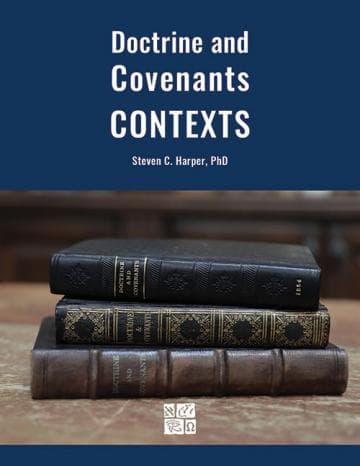Book
136 Chapters

April 1829, Harmony, Pennsylvania
Early in 1829, Joseph’s father-in-law was about to evict him. Joseph “cried unto the Lord that he would provide for me to accomplish the work whereunto he had commanded me.”[1] This prayer was answered on a Sabbath evening when Joseph's younger brother Samuel arrived with a twenty-two-year-old school teacher named Oliver Cowdery.
Oliver had learned about the marvelous work from Joseph’s family. He had prayed to know the truth of the matter, and the Lord showed him the Book of Mormon plates in a vision and told him of the translation Joseph had begun.[2] Oliver probably brought with him some money for Joseph to use to make a payment to his father-in-law.
On the second day after his arrival, Oliver began scribing as Joseph translated the Book of Mormon. Oliver had a normal inclination to fear and doubt things that had been revealed to him before. He wanted to know if he could believe what he was seeing and experiencing. The Lord responded with the reassuring revelation in section 6.
Speaking to Oliver through Joseph, the Lord assured Oliver that his gifts were indeed divine, as well as the revelation he received before. This had the effect of convincing Oliver once and for all that Joseph, however unrefined or lacking in literacy, was the Lord’s chosen seer, for out of Joseph’s mouth came the words of Jesus Christ, telling Oliver things Jesus knew but Joseph didn’t. Oliver wrote to David Whitmer, saying that Joseph had “told him secrets of his life that he knew could not be known to any person but himself, in any way other than by revelation from the Almighty.”[3]
Section 6 foreshadows sections 7 and 8 by telling Oliver about records that have been kept hidden due to wickedness and that Oliver can have the gift to translate if he desires it. The revelation foreshadows martyrdom, but it is encouraging and empowering to Oliver. It also bears a beautiful autobiographical witness of Christ, perhaps even in a visual way for Joseph and Oliver, the two young seers. The Lord invited them to “look unto me in every thought; doubt not, fear not. Behold the wounds which pierced my side, and also the prints of the nails in my hands and feet” (D&C 6:36–37). Like Peter, beholding the risen Christ gave Joseph and Oliver apostolic courage.
What we have in section 6, then, is a document of the Lord's lovingly employed omniscience. He is not the arbitrary sovereign Oliver's ancestors imagined him to be.[4] He uses his limitless power to address the needs of those who desire and ask. He proved to Oliver that Joseph Smith, whatever his “faults” (v. 19), is the Lord's chosen seer. The revelation not only says those things, but by its delivery through Joseph and its secrets known only to the Lord and Oliver, it illustrates them.
[1] “History, circa Summer 1832,” p. [6], The Joseph Smith Papers, accessed July 22, 2020.
[2] “History, circa Summer 1832,” p. [6], The Joseph Smith Papers, accessed July 22, 2020. “History, 1838–1856, volume A-1 [23 December 1805–30 August 1834],” p. 15, The Joseph Smith Papers, accessed July 22, 2020.
[3] James H. Hart, “About the Book of Mormon,” Deseret News (Salt Lake City), April 9, 1884, 190; see also “Report of Elders Orson Pratt and Joseph F. Smith,” Deseret News, November 27, 1878, 674.
[4] In his famous 1741 sermon, “Sinners in the Hands of an Angry God,” Jonathan Edwards described “the mere pleasure of God, I mean his sovereign pleasure, his arbitrary will, restrained by no obligation.” John E. Smith, Harry S. Stout, and Kenneth P. Minkema, editors, A Jonathan Edwards Reader (New Haven: Yale University Press, 1995), 90.
Book
136 Chapters
Items in the BMC Archive are made publicly available for non-commercial, private use. Inclusion within the BMC Archive does not imply endorsement. Items do not represent the official views of The Church of Jesus Christ of Latter-day Saints or of Book of Mormon Central.